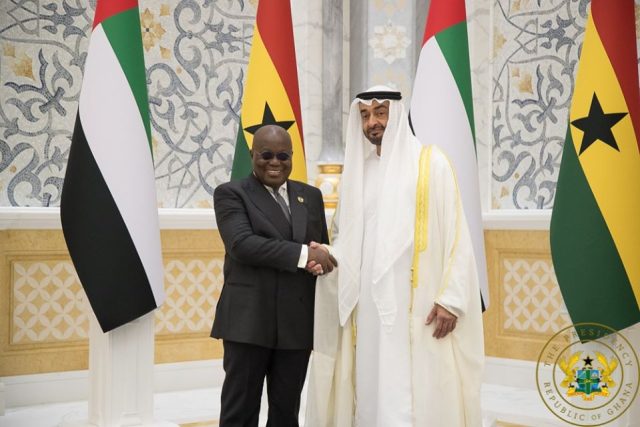Prof. Samuel Lartey
In a world increasingly threatened by climate change and environmental degradation, sustainable practices have become paramount for global development.
The government of Ghana’s recent partnership with the United Arab Emirates (UAE) for a $30 million grant signals a significant step forward in addressing these issues while providing alternative livelihoods to forest fringe communities.
This grant, part of the broader Resilient Ghana Package launched at COP28 in Dubai, aims to support forest protection, restoration and reforestation efforts, while advancing Ghana’s climate and biodiversity goals.
By focusing on both ecological restoration and economic benefits, this initiative will have far-reaching effects on governmental operations, the corporate sector and the livelihoods of ordinary Ghanaians.
Historical Context: Ghana’s environmental challenges
Ghana, like many countries in West Africa, has long faced environmental challenges due to deforestation, habitat destruction and unsustainable land-use practices. Historically, forest-dependent communities have relied heavily on timber and other forest resources, which, while critical for their survival, have placed immense pressure on the country’s natural ecosystems.
Between 1990 and 2015, Ghana lost about 33.7 per cent of its forest cover, primarily due to illegal logging, agriculture and mining activities.
According to a 2019 report from the World Resources Institute (WRI), Ghana had one of the highest deforestation rates in the world, losing nearly 60,000 hectares of primary rainforest between 2017 and 2018 alone.
To combat this growing threat, the Ghanaian government has initiated several programmes aimed at restoring degraded landscapes and promoting sustainable forest management.
Notable among these efforts is the Green Ghana initiative, launched in 2021, which aimed to plant five million trees nationwide. The $30 million grant from the UAE builds on these efforts by providing further resources for forest protection and alternative livelihoods.
Impact on governmental businesses
The $30 million grant will bolster governmental programs aimed at ecological restoration and sustainable development.
By supporting forest fringe communities with alternative livelihoods, the grant reduces reliance on environmentally destructive practices such as logging and unsustainable agriculture.
This shift will enable the government to redirect resources toward long-term environmental conservation efforts while also meeting international climate agreements, such as the Paris Agreement and the United Nations’ Sustainable Development Goals (SDGs).
By successfully implementing this project, the Ghanaian government may unlock further opportunities for international funding and collaboration, thereby boosting its diplomatic and trade relations, especially with Gulf nations and global environmental organisations.
Impact on the corporate sector
The corporate sector in Ghana stands to benefit significantly from the enhanced focus on environmental sustainability and green projects.
In the past, corporate entities engaged in forestry, agriculture and mining have contributed to environmental degradation, which has, in turn, led to greater scrutiny and regulatory pressure.
However, with this new initiative, companies in these sectors have the chance to realign their operations with sustainable practices and environmental conservation efforts.
For instance, agribusinesses operating near forest fringe communities can now explore partnerships with the government and international agencies to promote climate-resilient farming techniques, sustainable agroforestry and responsible land use.
The grant will also open up opportunities for corporate investment in eco-tourism, green infrastructure, and renewable energy projects, helping businesses shift toward more environmentally friendly operations.
The opportunity for businesses to engage in reforestation projects, support alternative livelihoods or invest in green technologies will not only boost their public image but also position them as key players in Ghana’s journey toward achieving its environmental and economic goals.
Impact on citizens and the economic landscape
At the grassroots level, the $30 million grant will have a profound impact on forest fringe communities by providing alternative livelihoods that promote sustainable practices.
This initiative will create jobs in forest restoration, tree planting, and other conservation activities, directly benefiting communities that rely on forest resources for survival.
Moreover, by reducing deforestation and promoting biodiversity conservation, the initiative will safeguard ecosystem services that are critical for agriculture, water supply and local climate regulation.
The economic benefits of this initiative extend beyond rural areas.
The national economy will benefit from the preservation of vital forest resources, which play a critical role in industries such as timber, eco-tourism and agriculture.
According to the World Bank, Ghana’s forestry sector contributes about 2.5 per cent of GDP, providing significant employment opportunities, especially in rural areas.
However, unsustainable exploitation of these resources has threatened the long-term viability of the sector.
By investing in reforestation and sustainable livelihoods, the government can safeguard this vital part of the economy while ensuring the long-term health of its forests.
By demonstrating tangible progress on climate action, Ghana may attract further international investment, aid, and green bonds that can fund additional environmental and economic projects.
Financial data and key figures
1. Ghana lost about 33.7 per cent of its forest cover between 1990 and 2015.
2. From 2017 to 2018, Ghana lost approximately 60,000 hectares of primary rainforest.
3. The forestry sector contributes around 2.5 per cent to Ghana’s GDP, providing jobs for thousands of citizens.
4. The $30 million grant will provide alternative livelihoods for forest fringe communities and contribute to forest restoration and reforestation.
5. The Green Ghana initiative, launched in 2021, aims to plant millions of trees across the country, complementing the UAE grant’s objectives.
Conclusion
The partnership between Ghana and the UAE for the $30 million grant exemplifies the critical role of international collaboration in achieving sustainable development and environmental restoration.
The initiative will not only contribute to forest protection, reforestation and habitat restoration but will also have far-reaching effects on Ghana’s governmental businesses, the corporate sector and its citizens.
By providing alternative livelihoods for forest fringe communities, the grant will create a more sustainable economic model, reducing dependence on forest resources while promoting environmental resilience.
This, in turn, will positively impact the national economy, providing long-term benefits for businesses and citizens alike.
As Ghana continues to strengthen its environmental policies and partnerships, the country will be better positioned to meet its climate goals, contribute to global biodiversity conservation and enhance its socioeconomic landscape.
The grant, therefore, represents a significant milestone in Ghana’s pursuit of sustainable development and environmental stewardship, signaling a brighter, more resilient future for the nation.








































